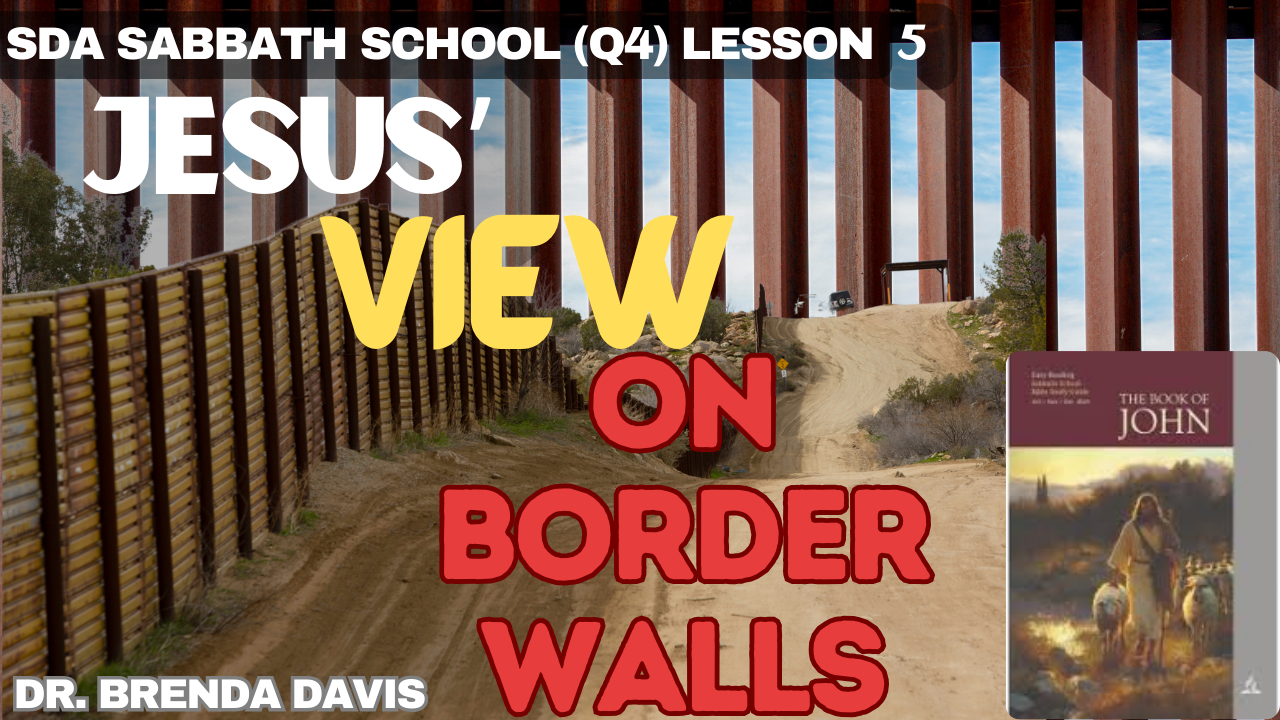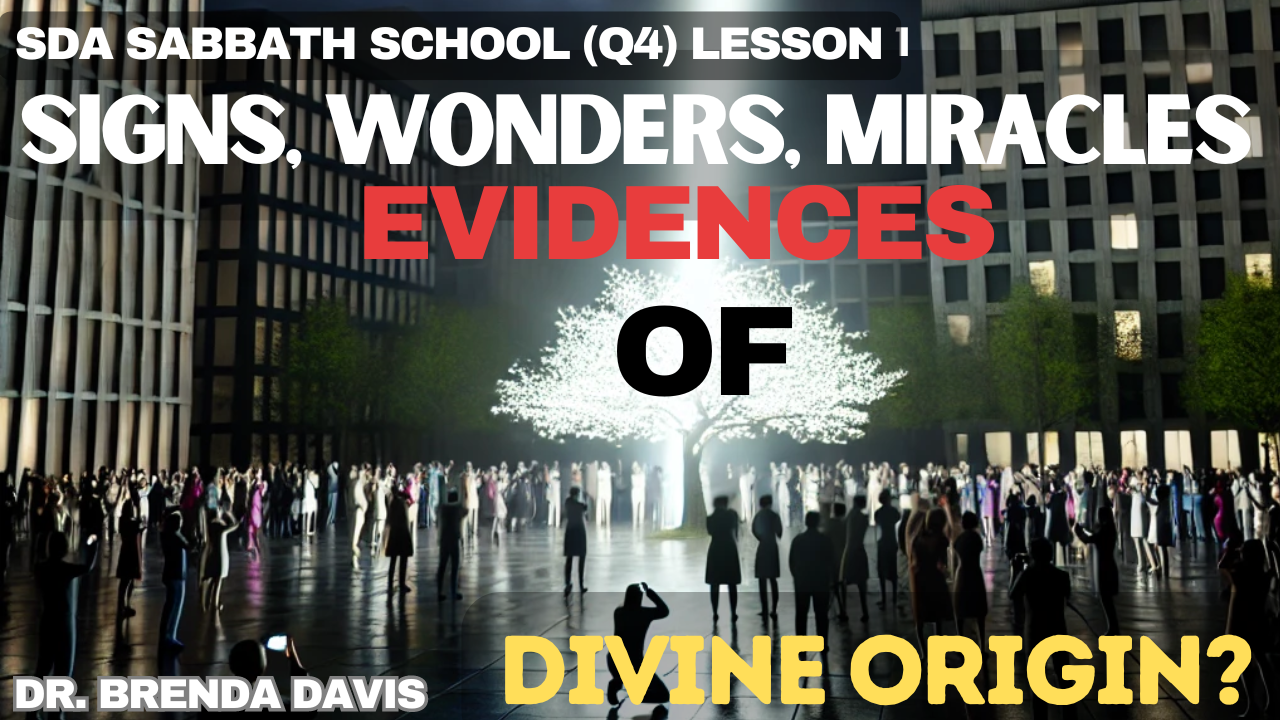Sabbath School Lesson Q4 God’s Mission, My Mission (Lesson 4) SHARING GOD’S MISSION Part 5-6
WHO DOES THE HIGH VALUED MAN LOVE?
Abraham, in God’s estimation, was a high-valued man. He loved and cared about everyone regardless of their race, gender, culture, ethnicity, or national origin. His love was displayed even in his prayer life. He prayed for the righteous and the wicked. How can we become regarded as high value in God’s eyes?
We are continuing our look at the love of God for us and his plan (his mission) to bridge the gap between us and him. We observe that his mission is to bring us back into a relationship with him. In bridging the gap between us and Him, He calls for us to become His disciples and members of his family. But it does not end with his call; a call without a reaction from the one being called is of no use. How should we react to the call?
Review our past and present videos at SabbathSchoolDaily.com or visit my YouTube Channel, Sabbath School by Dr. Brenda Ware Davis
You also may obtain the study guide for this series at Sabbath.School or ssnet.org
Let Us Inviting God’s Presence:
Holy Father, help us not strive to be high value in the estimation of what a man or woman deems as high value. Help us to strive for high value based on your estimations. In Jesus’ Name, Amen.
God’s Mission, My Mission
(Lesson 4)
SHARING GOD’S MISSION
Part 5 of 6
Abraham’s Mission
Genesis 19:1–29 gives us insight into God’s valuation of a person. Notice the position of Lot in the city of Sodom. It says that “Lot was sitting in the gate of Sodom” (Genesis 19:1 NKJV). What does this mean?
It means that Lot was an important person in the city. He was most likely a public official because he was sitting at the city gate, which was historically a privilege for officers, judges, and kings. The following Old Testament scriptures support this idea.
2 Samuel 19:8
8 Then the king arose and sat in the gate. And they told all the people, saying, “There is the king, sitting in the gate.” So all the people came before the king. For everyone of Israel had fled to his tent. (2 Samuel 19:8)
Jeremiah 38:7
7 Now Ebed-Melech the Ethiopian, one of the eunuchs, who was in the king’s house, heard that they had put Jeremiah in the dungeon. When the king was sitting at the Gate of Benjamin, (Jeremiah 38:7)
Ruth 4:1
1 Now Boaz went up to the gate and sat down there; and behold, the close relative of whom Boaz had spoken came by. So Boaz said, “Come aside, friend, sit down here.” So he came aside and sat down. (Ruth 4:1) (Split)
So, Genesis 19:1 shows us that Lot was an important person in the city. At the very least, he was a public official.
Another interesting thing about Genesis 19 is that it closely parallels Genesis 18 regarding Abraham’s encounter with the heavenly visitors.
Many things that happened in Genesis 18, with Abraham’s encounter with the angels, also happened in Genesis 19, with Lot and the heavenly visitors.
For instance, we see in Genesis 18:1 and Genesis 19:1 that Abraham and Lot sat at the city gate.
In Genesis 18:3 and Genesis 19:1, we discover that Abraham and Lot invite strangers into their homes to rest.
In Genesis 18:4–8 and Genesis 19:3, we find that Abraham and Lot prepare food for their visitors.
What does this say?
Whatever weaknesses and bad habits Lot may have had, like his uncle Abraham, he was friendly, caring, and kind to strangers. In other words, Lot has some good characteristics. It is good characteristics, not possessions, that God values in us.
In other words, It is a good character that makes a high-valued man or woman, not possession, position, money, power, or wealth.
Recall that in the previous video, we learn of Abraham’s great love for Sodom and Gomorrah. He demonstrates his love toward them in that when he finds that the Lord is planning to destroy these wicked cities, he petitions that He would spare the cities if He could find at least ten righteous people in it.
But what happened to Sodom and Gomorrah?
Genesis 19:24, 25
“Then the Lord rained brimstone and fire on Sodom and Gomorrah, from the Lord out of the heavens. So He overthrew those cities, all the plain, all the inhabitants of the cities, and what grew on the ground” (Genesis 19:24, 25, NKJV).
Sodom and Gomorrah were destroyed!
It says in Patriarchs and Prophets: “The sun was risen upon the earth when Lot entered into Zoar.” The bright rays of the morning seemed to speak only prosperity and peace to the cities of the plain. The stir of active life began in the streets; men were going their various ways, intent on the business or the pleasures of the day.
The sons-in-law of Lot were making merry at the fears and warnings of the weak-minded old man. Suddenly and unexpectedly, as would be a thunder peal from an unclouded sky, the tempest broke. The Lord rained brimstone and fire out of heaven upon the cities and the fruitful plain; its palaces and temples, costly dwellings, gardens and vineyards, and the gay, pleasure-seeking throngs that only the night before had insulted the messengers of heaven—all were consumed. . . .
We are taught the fearful and solemn lesson that while God’s mercy bears long with the transgressor, there is a limit beyond which men may not go on in sin. When that limit is reached, then the offers of mercy are withdrawn, and the ministration of judgment begins.—Patriarchs and Prophets, p. 162.
We don’t know how many people lived in Sodom and Gomorrah at the time that God destroyed those cities. But we do know that only four people left Sodom (Lot, his wife and his two daughters), and only three of them were saved (Lot and his two daughters).
The same with the Flood in Genesis. We don’t know how many people lived at the time of the Flood. But we know that most of them were not saved. Only Noah and his family went into the Ark.
From the Book The Great Controversy says: Through the deceptive power of Satan, the workers of wickedness obtain sympathy and admiration and are thus constantly leading others to rebellion. It was so in Cain’s and in Noah’s day, and in the time of Abraham and Lot; it is so in our time. It is in mercy to the universe that God will finally destroy the rejecters of His grace.—The Great Controversy, p. 543.
The small number of people from Sodom who were saved is a word of warning to us in our work for God. Not everyone whose life we touch will be saved. Of course, we want everyone to accept Jesus and be saved. At the same time, we must remember that each person has free choice.
So, what is our job? What is our mission?
Our mission is to invite as many people as possible to make the choice for Jesus and God’s plan to save us. God will send His Holy Spirit to help us in fulfilling his mission to invite people to reunite with him. But God will never force anyone to accept Him. He will not go against a person’s free will.
Free will means that those we pray for have a choice to be saved or lost.
Genesis 12:1-9 provides further insight into the importance of submitting to God’s will. Read Genesis 12:1-9 to find out more about freewill and choice, and then continue viewing this video, Part 6: of 6 Submission to God’s Will.
God’s Mission, My Mission
(Lesson 4)
SHARING GOD’S MISSION
Part 6 of 6
Submission to God’s Will
Genesis 12:1–9 teaches that God’s valuation of a man or woman is found in us choosing to surrender our wills to Him. It is found in choosing to give God total control of our lives.
One of the main qualities of Abraham was his submission to God’s will. He chose to allow God to be in complete control of his life.
The following are three experiences in Abraham’s life in which he surrendered his will to God.
Abraham’s Calling – His Work: God gave Abraham (who was called Abram until God changed his name to Abraham) a challenge in Genesis 12:1
1 Now the Lord had said to Abram: “Get out of your country, From your family And from your father’s house, To a land that I will show you. (Genesis 12:1)
God called him to leave his people and his country. When Abraham heard the voice from heaven, how did he react? Did he pay no attention to it, assuming he was hallucinating? Or did he tell God, “I don’t want to go anywhere? I like where I am living”?
No, Abraham obeyed God. Abraham may have thought that God’s description, “the country that I will show you,” was a strange description of the place he was to go.
But Abraham chose to go anyway. Abraham accepted the call. He surrendered himself to God, and Genesis 12:4 tells us he left his father’s house and his country:
4 So Abram departed as the Lord had spoken to him, and Lot went with him. And Abram was seventy-five years old when he departed from Haran. (Genesis 12:4).
Abraham’s Choice of Land: In Genesis 13, we discover that there was contention between the servants of Lot (Abraham’s nephew) and Abraham’s servants. But Abraham didn’t want to be fighting with his own flesh and blood. So, being a man of great character, he submitted himself to the will of God. He did what God wanted him to do. And in return, in Genesis 13:14-15, we see that again, God blesses Abraham.
14 And the Lord said to Abram, after Lot had separated from him: “Lift your eyes now and look from the place where you are—northward, southward, eastward, and westward;
15 for all the land which you see I give to you and your descendants forever. (Genesis 13:14, 15).
Then there was the Destruction of Sodom and Gomorrah: After God tells Abraham what will happen to Sodom and Gomorrah, what does Abraham do? Abraham has a heart filled with love, piety, and compassion for Sodom and Gomorrah. Therefore, he tries to save these cities. Sad to say, there were not even ten righteous people in Sodom and Gomorrah. So, these cities were destroyed. Abraham surrenders to God’s will and accepts God’s final judgment, his final decision to destroy these wicked cities.
The Lord had a high valuation of Abraham because he surrendered his heart and life to God. The Lord was able to use Abraham because of his submission to God in all circumstances. A high-valued man or woman is one whose heart is completely surrendered to God. God requires the same for you.
Here is your challenge for this week.
Challenge #1: In our cities, we face obstacles in sharing the Good News about Jesus and his saving power. Plead with God to intervene on behalf of the people in your city.
For those up to a greater challenge:
Challenge #2: Is there someone you know who is in a difficult situation or having a difficult time? Pray for this person. Ask God to show you what you can do to help this person.
————————————————
Share your results in the comment section below.
Thank you for watching this video. To be notified when my next video comes out, Subscribe to my YouTube Channel, Sabbath School, by Dr. Brenda Ware Davis.
If you enjoyed this video and you want to use it to help in fulfilling God’s mission, click Like…..then…..Share. Thank you for Liking, Sharing, and Subscribing.
Hebron Seventh-day Adventist Church
7902 Wheatly Street
Houston, TX 77088
Watch Past and Present Lessons at SabbathSchoolDaily.com














Post Comment